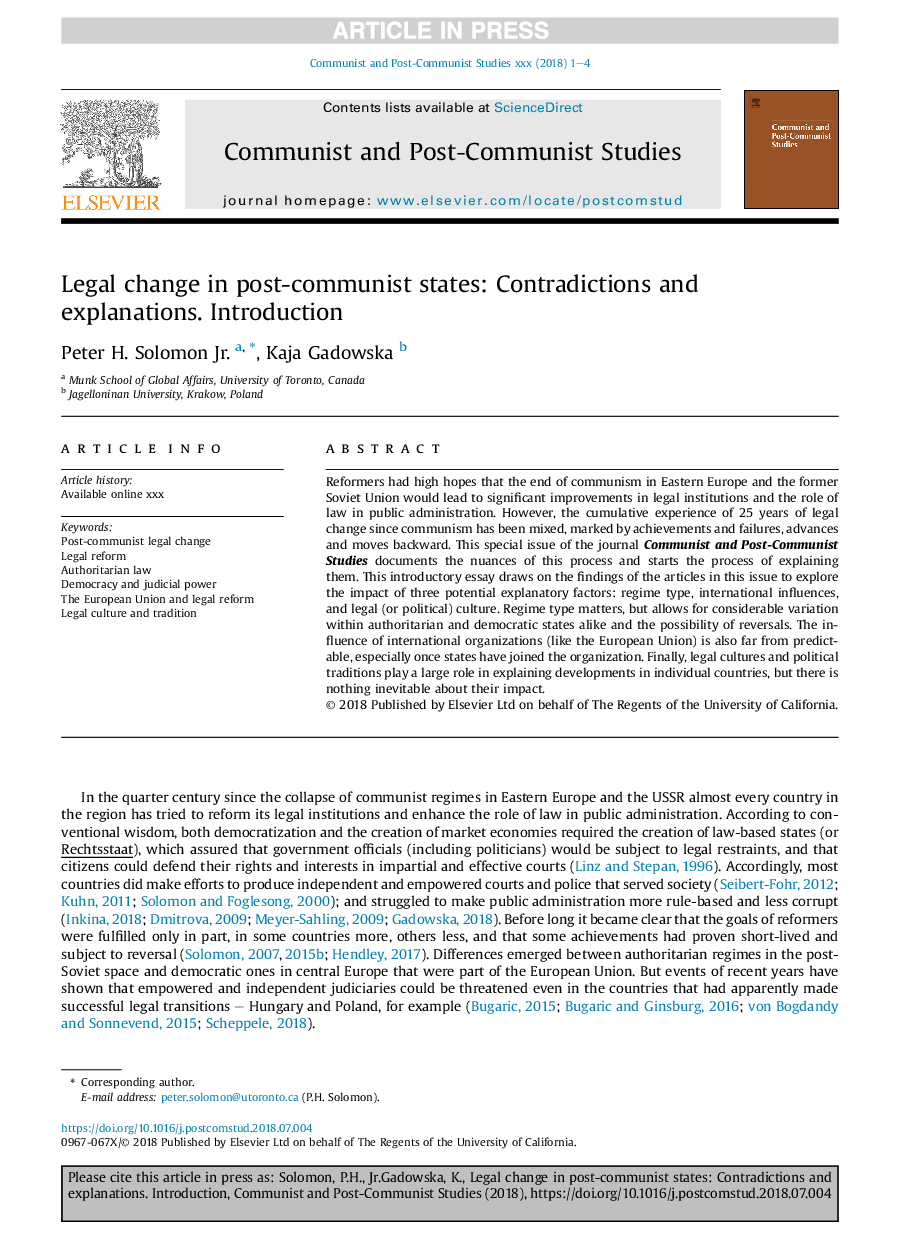| کد مقاله | کد نشریه | سال انتشار | مقاله انگلیسی | نسخه تمام متن |
|---|---|---|---|---|
| 10226939 | 1701318 | 2018 | 4 صفحه PDF | دانلود رایگان |
عنوان انگلیسی مقاله ISI
Legal change in post-communist states: Contradictions and explanations. Introduction
ترجمه فارسی عنوان
تغییرات قانونی در دولت های پست کمونیستی: تناقض ها و توضیحات. معرفی
دانلود مقاله + سفارش ترجمه
دانلود مقاله ISI انگلیسی
رایگان برای ایرانیان
کلمات کلیدی
تغییر قانونی پست کمونیستی، اصلاحات قانونی، قانون اقتدارگرا، دموکراسی و قدرت قضایی، اتحادیه اروپا و اصلاحات قانونی، فرهنگ و سنت حقوقی
ترجمه چکیده
اصلاح طلبان امید زیادی داشتند که پایان کمونیسم در اروپای شرقی و اتحاد جماهیر شوروی سابق به بهبود قابل توجهی در نهادهای قانونی و نقش قانون در اداره عمومی منجر شود. با این حال، تجربه تجمعی 25 ساله تغییر قانونی از زمان کمونیسم مخلوط شده است، با موفقیت و شکست، پیشرفت و حرکت عقب مانده است. این شماره ویژه مجله مطالعات کمونیست و کمونیستی، تفاوت های ظاهری این فرآیند را تشکیل می دهد و روند توضیح آنها را آغاز می کند. این مقدماتی مقدماتی بر یافته های مقالات در این موضوع به منظور بررسی تاثیر سه عامل توضیحی بالقوه: نوع رژیم، تاثیرات بین المللی و فرهنگ قانونی (یا سیاسی) استوار است. نوع رژیم اهمیت دارد، اما اجازه می دهد تا تغییرات قابل توجهی در داخل دولت های اقتدارگرا و دموکراتیک به طور یکسان و امکان تغییرات. تأثیر سازمان های بین المللی (مانند اتحادیه اروپا) نیز بسیار قابل پیش بینی است، به ویژه هنگامی که دولت ها به سازمان ملحق شده اند. سرانجام، فرهنگ های حقوقی و سنت های سیاسی نقش مهمی در توضیح تحولات در کشورهای مختلف بازی می کنند، اما در مورد تاثیرات آنها اجتناب ناپذیر است.
موضوعات مرتبط
علوم انسانی و اجتماعی
علوم اجتماعی
توسعه
چکیده انگلیسی
Reformers had high hopes that the end of communism in Eastern Europe and the former Soviet Union would lead to significant improvements in legal institutions and the role of law in public administration. However, the cumulative experience of 25 years of legal change since communism has been mixed, marked by achievements and failures, advances and moves backward. This special issue of the journal Communist and Post-Communist Studies documents the nuances of this process and starts the process of explaining them. This introductory essay draws on the findings of the articles in this issue to explore the impact of three potential explanatory factors: regime type, international influences, and legal (or political) culture. Regime type matters, but allows for considerable variation within authoritarian and democratic states alike and the possibility of reversals. The influence of international organizations (like the European Union) is also far from predictable, especially once states have joined the organization. Finally, legal cultures and political traditions play a large role in explaining developments in individual countries, but there is nothing inevitable about their impact.
ناشر
Database: Elsevier - ScienceDirect (ساینس دایرکت)
Journal: Communist and Post-Communist Studies - Volume 51, Issue 3, September 2018, Pages 173-176
Journal: Communist and Post-Communist Studies - Volume 51, Issue 3, September 2018, Pages 173-176
نویسندگان
Peter H. Jr., Kaja Gadowska,
